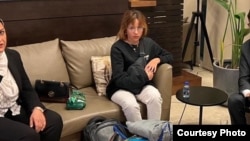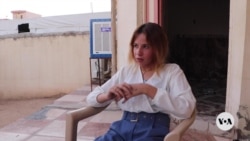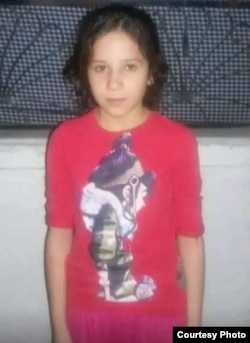The State Department has confirmed to VOA the success of a complicated mission to rescue an Iraqi national and former Islamic State sex slave from Gaza via Israel.
Because of a long-running diplomatic rift between Israel and Iraq, it took months of vigorous efforts by humanitarian activists and direct intervention from U.S. diplomatic missions in the region to coordinate the young woman’s rescue. Cooperation among Israeli, Jordanian, Iraqi and United Nations officials was involved.
“On October 1, 2024, the United States helped to safely evacuate from Gaza a young Yazidi woman to be reunited with her family in Iraq,” a State Department spokesperson told VOA on Wednesday, adding that the young woman’s story “is heartbreaking, and we are glad that she will be reunited with her family in Iraq.”
Enslaved by Islamic State
Now 21, Fawzia Amin Saydo was kidnapped by Islamic State militants from her hometown of Sinjar in August 2014, just a month before her 11th birthday.
She and two of her brothers, aged 7 and 10 at the time, were among thousands of Yazidis enslaved by IS due to their religious beliefs.
Although the brothers found a way to escape, Saydo spent years suffering violence, injustice and rape by IS fighters. By early 2015, she was taken to the Syrian city of Raqqa where she was imprisoned and raped before being forcibly “married” to a then 24-year-old Palestinian IS fighter.
"He told me that I had to sleep with him. On the third day, he went to a pharmacy and brought a drug that numbs part of the body. He gave me the drug and I cried,” Saydo recounted in an August 2023 interview from Gaza with the Kurdish media outlet Rudaw.
About a year after her arrival in Raqqa, Saydo’s life took another turn when she gave birth to a boy, the first of two children she would have with the Palestinian IS fighter.
Saydo decided to dedicate her life to her children, despite the husband turning more abusive, especially after he married another woman.
By the end of 2018, when the U.S.-led Kurdish forces squeezed IS out of the group’s territories in Syria, Saydo, then 15 years old, lost contact with her Palestinian captor, who had escaped from northeast Syria to the rebel-held Idlib province in northwest Syria.
In early 2019 she was driven to Idlib to be returned to her captor, but their reunion was brief, as the Palestinian militant was soon reported dead. No cause of death was reported.
Fearing that her community back in Sinjar, Iraq, might not accept her children — Yazidi spiritual leaders that same year had issued a decree stating that children of rape by IS militants would not be welcomed into the faith — Saydo decided to move in with the Palestinian man’s family in Gaza, where she arrived in 2020.
Stuck in Gaza
Humanitarian activists who followed Saydo’s case told VOA that her circumstances in Gaza presented a gut-wrenching choice: stay with her children and endure the Palestinian family that became abusive just as their late son had been, or escape — alone and without her children — in the hopes of reuniting with long-lost family in Sinjar.
Her resolve to leave was strengthened by Hamas’ deadly October 7 attack on Israel.
“This has been by far the most complicated case I have worked on,” said Steve Maman of the Montreal-based Liberation of Christian and Yazidi Children of Iraq.
It took Maman and a small team of Iraqi activists several months of lobbying Iraqi, U.S., and Israeli officials. While waiting for a final decision from Israel, Maman and his supporters helped her escape the Palestinian family’s home and hide in a house about 2 kilometers away from the Israeli army at Kerm Shalom crossing.
The rescue process, which VOA has followed since early September, was slow and rescheduled several times due to the difficulty of navigating the Israel-Iraq diplomatic rift.
“I have no idea why every party was so hesitant to act on such a humanitarian case. Now I can finally get my much-needed sleep,” one of Maman’s supporters who asked that his name be withheld, told VOA.
Another activist from Sinjar, Sufyan Waheed Hammo, told VOA, “The Iraqi officials were very helpful when it came to preparing paperwork, but they couldn’t do much diplomatically because of the Iraqi law.”
Iraq's parliament in May 2022 passed legislation that criminalized any ties with Israel.
According to Maman, what finally triggered U.S. officials in the region to make a final push to rescue her was “a deeply troubling incident” that occurred just a day before her rescue.
“She was walking alone when a group of men abused her.”
Complicated handoff
In the early morning of October 1, a “personnel team” whose individual identities are known only to U.S., U.N. and likely Israeli officials, drove Saydo to Israel via Kerm Shalom crossing in a U.N. ambulance. According to Maman’s supporters, Saydo arrived at the U.S. Embassy in Jerusalem that day before moving on to Jordan via the Allenby Bridge crossing.
Salwan Sinjaree, chief of staff to Iraq’s foreign minister, told VOA that his government had no contact with the Israeli government during the rescue process.
“Our embassy in Amman received her, prepared travel documents for her, and hired a plane to fly her back to Baghdad with one of our female embassy staff,” Sinjaree told VOA. “All our contacts during the process have been with the U.S. embassy, the Jordanian foreign ministry, and the U.N. We have not made any communication with Israel.”
The official from the Israeli Prime Minister Benjamin Netanyahu’s office who was tasked to handle the case turned down VOA’s request for comment.
Saydo arrived in Baghdad via a plane around 10:30 a.m. local time Wednesday. She was then escorted by a team of Iraqi intelligence officers to Mosul, where she was reunited with family.
Saydo’s brother Barzan told VOA from Germany that the rest of his family, including their mother, sister, and two brothers, are thrilled to see her after a decade apart.
Her father, however, would not be there to witness his daughter’s return, Barzan added, because he died of a heart attack just two months prior, “caused by the pain of the separation from her.”
“We welcome her back and support her decision to return home. She didn’t have any choice in what happened,” he told VOA. “My heartfelt thanks every single person who helped to rescue her.”
Ongoing trauma
Beyond Saydo’s trauma of the past decade, however, is a new kind of pain in the wake of reunion: the reality of now living apart from her young son and daughter, who remain with their father’s family in Gaza.
Despite the impossible choice with which Saydo was confronted in Gaza, some still insist on judging her decision to flee her captor’s family.
“No mother would leave her children. They came from her belly,” an activist associated with Maman who wanted to be cited only by his first initial, D, told VOA.
According to Mirza Dinnayi, a Yazidi activist based in Germany, at least 2,745 Yazidis remain missing since the 2014 IS massacre of some 5,000 members of their religious community.
That event, which the U.N. has said constitutes an act of genocide, also resulted in the abductions of young Yazidi women like Saydo and the displacement of an estimated 100,000 members of the faith who were forced to take refuge outside of Iraq.
“We do not know if those missing people are still alive or not. If they are alive, they are probably held in different places of Syria such as in al-Hol camp or in areas controlled by terrorists in northwest Syria,” Dinnayi told VOA. “There are rare cases of Yazidis found in Turkey and some unverified reports about some people taken to Egypt.”
For Maman and his fellow activists, saving Saydo from conflict-ridden Gaza is a way to help the community recover. It is also a message of hope at a time when tensions between Israel and Iran enter a new phase.
“I am a practicing Jew, and I was willing to put aside my life to help a Yazidi girl get out,” he told VOA. “I had to fight my contacts in this case because it was not that easy, but the result is at the end a life is saved.”
The State Department spokesperson told VOA that they are asking people to respect Saydo’s privacy “for her own safety while she reunites with loved ones and returns home.”
Dakhil Shammo of VOA’s Kurdish Service contributed reporting from Washington.







